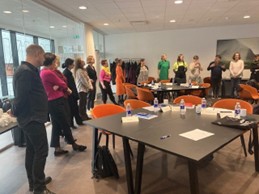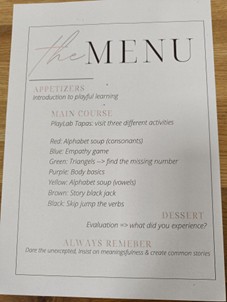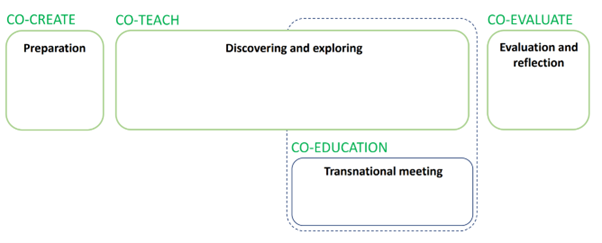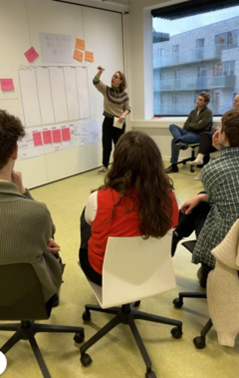This website use cookies to ensure you get the best experience on our website
The first Co-education Development Lab

Partners from Teacher Academy, Erasmus+, 21st Century European Teachers project met in Aarhus for the first Co-education development lab.
After a cycle of study visits from one partner institution to another organised between November 2023 and January 2024, all project partners meet for the first time in person at the wonderful VIA University College in Aarhus, Denmark. The first Co-education development lab was dedicated to the topic of Sustainable learning, while other emerging subjects (technological empowerment, entrepreneurship, and playful learning) will be in focus of the next four co-education development labs.

The Co-education Development Labs are focused on the collaborative development of innovative 21st-century learning modules across five partner countries. This initiative aims to integrate these modules into both pre-service and in-service teacher education programs, emphasising the use of lesson plans derived from the 21st Century European Teacher model. These lesson plans are designed specifically for teaching lower-secondary school students. Following the development phase, the next crucial step involves implementing these lesson plans in local schools within the partner countries. This implementation process includes observations and feedback exchanges among the partner nations, fostering a dynamic and mutually beneficial approach to modernising educational practices.
How to teach and learn for a sustainable future
The first Co-education development lab and transnational meeting were organised from 20th to 22nd March 2024 with two days at VIA University College, and one day at Kolind School for 35 participants, pre-service and in-service teachers and university researchers from five countries (Denmark, Finland, Spain, Romania and Italy). The first day was dedicated to sustainable learning in a Danish Educational Context, playful learning practice in VIA and discussion about current experiences in the co-education model. Those activities were supported by the paper The concept of Sustainability in a Danish Context prepared by Jesper Garsdal, and a lecture about Education for Sustainable Development by Jeppe Kiel Christensen.
Sustainability is a buzzword that has gained increasing attention in recent years, especially in the wake of the UN's adoption of the 17 Sustainable Development Goals in 2015. But what does it mean to teach and learn for a sustainable future? How can teacher educators, in-service and pre-service teachers collaborate across borders and disciplines to address the complex challenges of our time? And what role does the concept of sustainable development play in shaping a new worldview and a new educational paradigm?
These were some of the questions that motivated the Teacher Academy Transnational Meeting, a three-day event that took place in Aarhus, Denmark, from March 20th to 22nd, 2024. The meeting was part of the Teacher Academy project, a European initiative that aims to develop innovative and interdisciplinary approaches to teacher education and professional development, with a focus on sustainability, playful learning, technological empowerment and entrepreneurship. The project involves partners from Finland, Spain, Romania, Italy, Belgium, and Denmark, and is co-funded by the Erasmus+ programme of the European Union.

The meeting in Aarhus brought together teacher educators, pre-service and in-service teachers and educational experts from the partner countries. The participants had the opportunity to exchange experiences and ideas, learn from each other, and co-create new solutions for teaching and learning for a sustainable future. The meeting also included a visit to Kolind School, a local school that has been involved in a joint learning module with the Danish partner, VIA University College, where pre-service and in-service teachers have been co-teaching and co-learning about sustainability with the students. There was also an introduction session to playful learning by the pre-service teachers studying in VIA that put a smile on everyone's faces and made us feel like kids again
The co-education model
One of the main outcomes of the meeting was the presentation and discussion of the co-creation model, a pedagogical framework that has been developed and will be tested by the Teacher Academy project in different learning interventions across different partner countries. The co-creation model is based on the idea that teaching and learning require a collaborative and participatory approach, where educators and students work together as co-creators, co-teachers, and co-evaluators of knowledge and action. The model consists of four phases: preparation, discovering and exploring, co-teaching, and evaluation and reflection
Ane Wolfsberg and Louise Lottrup presented a co-education model and how they organised it for a team of around 15 pre-service and in-service teachers, through four phases:
- Co-Create: preparation of different resources for the teaching process
- Co-Teach: discovering and exploring – pre-service and in-service teachers taught together; students with support from pre-service teachers showed their work on the last day
- Co-Education: observation and participation of international team
- Co-Evaluation: reflection by pre-service and in-service teachers together with the international team

- Preparation: In this phase, the pre-service and in-service teachers plan the upcoming joint learning module, in cooperation with the teacher educators and the local school. They define the theme, the goals, the methods, and the materials for the module, based on the principles of sustainability, interdisciplinarity, and digitalization.
- Discovering and exploring: In this phase, the pre-service and in-service teachers co-teach the participating classes at the local school, using a variety of activities and workshops that engage the students in exploring the theme of sustainability from different perspectives. The students also work on their own projects, where they apply their knowledge and skills to address a specific sustainability challenge.
- Co-teaching: In this phase, the pre-service and in-service teachers co-teach the classes together, using a collaborative and reflective approach. They support each other, share feedback, and learn from each other's experiences and practices. They also involve the students in the co-teaching process, by inviting them to share their opinions, questions, and suggestions.
- Evaluation and reflection: In this phase, the pre-service and in-service teachers evaluate and reflect on their joint learning experience, together with the teacher educators, the students, and the school leaders. They assess the outcomes and the impact of the module, identify the strengths and the challenges, and discuss the implications and the recommendations for future practice.

The co-creation model aims to foster a culture of collaboration, innovation, and empowerment among educators and students, as well as to promote a holistic and transformative understanding of sustainability, as a concept that encompasses environmental, social, and economic dimensions. The model also seeks to develop the competencies that are needed for a sustainable future, such as critical thinking, creativity, communication, and citizenship.
On the second day whole, the international team participated in the co-education phase at Kolind school, collaboratively observing students working together on different sustainability-oriented activities, like establishing a fruit garden, recycling clothes into useful objects, and cooking diverse food from sustainable ingredients.
The reflection phase on the final day was focused on the analysis of how the co-education model was organised between VIA University College and Kolind School, how other partners can implement it in their context and how this new knowledge will be used to create the next joint learning module. Activities for implementation in all participating countries were planned in collaboration among pre-service and in-service teachers from all five countries.
The challenges and the opportunities

The meeting in Aarhus also provided a space for the participants to share and discuss the challenges and the opportunities that they have encountered in implementing the co-creation model and the Teacher Academy project in general. Some of the main challenges that were highlighted were:
- The lack of time and resources for planning and conducting the joint learning module, especially in relation to the curriculum and the assessment requirements.
- The difficulty of establishing a non-hierarchical and trustful cooperation between the pre-service and in-service teachers and teacher educators. The resistance and scepticism from some colleagues, parents, and policymakers, who may not see the value or the relevance of the co-creation model and the sustainability theme.
- The complexity and the uncertainty of sustainability issues, which may raise ethical, political, and emotional dilemmas and conflicts.
On the other hand, some of the main opportunities that were emphasized were:
- The possibility of creating meaningful and authentic learning experiences for the students, where they can explore real-world problems and solutions, and develop their own agency and voice.
- The opportunity of enhancing the professional development and the well-being of the teachers, where they can expand their knowledge and skills, and find support and inspiration from their peers.
- The potential of building a network and a community of practice among the teachers, the students, the schools, and the other stakeholders, where they can exchange ideas and resources, and collaborate on common goals.
- The chance to contribute to the global movement for sustainability, where they can raise awareness and take action on the local and global challenges and align their work with the UN's Sustainable Development Goals.

The way forward
The meeting in Aarhus was a valuable and inspiring event that demonstrated the achievements and the challenges of the Teacher Academy project, as well as the importance and urgency of teaching and learning for a sustainable future. The participants agreed that the co-creation model is a promising and innovative pedagogical framework that can be adapted and applied to different contexts and levels of education, and that can be further developed and improved through research and practice. They also expressed their commitment and their enthusiasm to continue working on the project, and to disseminate and share their results and experiences with other educators and stakeholders.
The meeting also paved the way for the next steps of the project, which include the following activities:
- The publication of a report that summarizes and analyses the outcomes and the impact of the co-creation model and the joint learning module, based on the data and the feedback collected from the participants.
- The creation of the next iterative version of the co-creation model that will be tested, introduced and reflected on during the visit to Finland
- The development of a MOOC (Massive Open Online Course) that introduces and explains the co-creation model and the Teacher Academy project and the four different topics of the project. The MOOCs also provide examples and guidelines for implementing and evaluating the model in different educational settings.
This first Co-education development lab enabled stronger connections among partnering institutions and showed in real practice how to create successful transformation through co-creation, co-teaching, co-education and co-evaluation.
The Teacher Academy project is an exciting and important initiative that aims to transform the way we teach and learn for a sustainable future. By fostering collaboration, innovation, and empowerment among educators and students, the project hopes to contribute to the development of a new worldview and a new educational paradigm, where sustainability is not only a goal, but also a way of being and becoming.

Funded by the European Union. Views and opinions expressed are however those of the author(s) only and do not necessarily reflect those of the European Union or the European Education and Culture Executive Agency (EACEA). Neither the European Union nor EACEA can be held responsible for them.